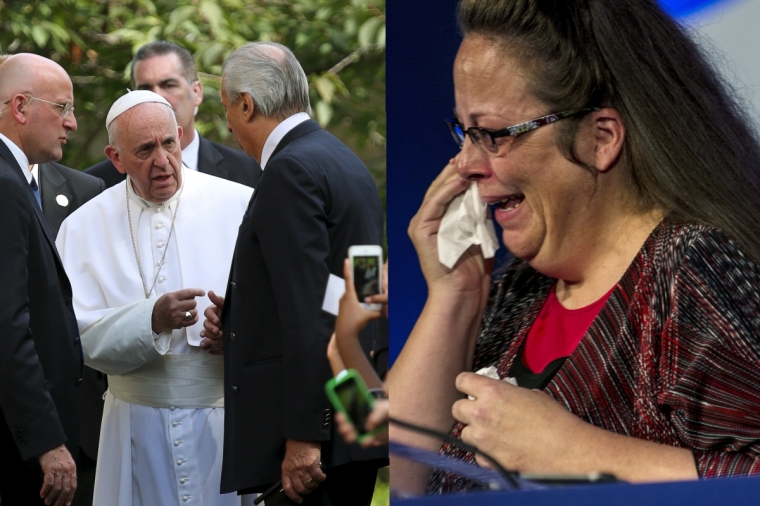After meeting Kim Davis, Pope Francis says 'conscientious objection' appropriate for government officials

WASHINGTON (Christian Examiner) -- While some American evangelicals and leading religious authorities continue to argue over the whether it is appropriate for a government official to express a "conscience objection" to a moral issue of the day – Pope Francis has said such an objection is a "human right" and one does not lose that right when throwing on the mantle of a government official.
The pope made his remarks after a "secret" meeting with Kim Davis, the county clerk from Rowan County, Kentucky who was jailed for six days after refusing to issue marriage licenses to same sex couples.
"Thank you for your courage," Pope Francis told Davis in English, as he held out his hands and asked her to pray for him. "I will, please pray for me," she asked, according to a report by "Inside the Vatican Magazine" writer, Robert Moynihan.
Moynihan said he spoke to Davis soon after she and her husband met with Pope Francis Thursday, Sept. 24, just a few minutes before he flew to New York City. She was in Washington to receive a Cost of Discipleship award at the Family Research Council's Values Voter Summit on Friday Night. The Vatican has confirmed the meeting took place at the Vatican Embassy in Washington.

"I hugged him and he hugged me back," Davis told Moynihan. "It was an extraordinary moment. 'Stay strong,' he said to me. Then he gave me a rosary as a gift, and he gave one also to my husband, Joe. I broke into tears. I was deeply moved.'"
Davis told her lawyer Mathew Staver she would give the rosaries to her parents, who are Catholic. Her mother, according to a Liberty Counsel news release, was elected Clerk of Court for Rowan County for 37 years until her 2014 retirement.
"I was humbled to meet Pope Francis. Of all people, why me?" Davis said in the release. "I never thought I would meet the Pope. Who am I to have this rare opportunity? I am just a County Clerk who loves Jesus and desires with all my heart to serve him."
Staver said Davis has become a symbol of the "worldwide conflict between Christian faith and recent cultural challenges regarding marriage," and called "threats to religious freedom" universal.
"Religious freedom is a human right that comes from God," Staver said.
POPE COMMENTS
Pope Francis spoke of religious freedom in broader terms after his private meeting with Davis, responding to a reporter on his plane enroute to Rome.
"[C]onscientious objection is a right that is a part of every human right. It is a right," Francis said. "And if a person does not allow others to be a conscientious objector, he denies a right. Conscientious objection must enter into every juridical structure because it is a right, a human right."
Further, the pope, when asked if the "right" to conscientious objection should extend to government officials, answered: "It is a human right and if a government official is a human person, he has that right. It is a human right."
The news of the pope's private meeting comes at the same time Jim Obergefell penned an open letter to Kim Davis, addressing her by her first name in an apparent attempt to school her on her morality, and sharing with her his views on family and on love.
Obergefell was obviously bolstered by United State President Barrack Obama's support of the U.S. Supreme Court's nearly split decision ruling states could not insist on traditional marriage only between one man and one woman.
PIPER AND MOORE
Evangelical leaders have debated whether Kim Davis should have resigned, given her position as a government official.
John Piper, found of Desiring God Ministries, in a Sept. 11 podcast, "Is Kim Davis Right to Refuse Marriage Licenses?" said clearly he believes Kim Davis is "morally right and probably legally right" in refusing to put her name on same sex marriage licenses.
Russell Moore, president of the Southern Baptist Convention's Ethics and Religious Liberty Commission in a piece he co-authored with the ERLC's director of policy studies Andrew T. Walker, however, said the situation is more complex and government officials while entitled to religious liberty, do not have an "absolute claim" on it.
The article references a "balancing test" for government officials who operate in their capacity as an agent of the state.
"Government officials have a responsibility to carry out the law," Moore and Walker wrote. "When an official can no longer execute the laws in question due to an assault on conscience, and after all accommodating measures have been exhausted, he or she could work for change as a private citizen, engaging the democratic process in hopes of changing the questionable law."
MOHLER DESCRIBES POPE'S BEHAVIOR AS 'BIZARRE'
Comments regarding pope's visit with Davis have ranged from critical to warm.
The Washington Post said Robert George, president of the U.S. Commission on International Religious Freedom, lauded the pope's encounter with the Kentucky clerk.
"I think he would stand up for anybody's conscience rights, but I think [the meeting] probably increased the pope's sense of the importance of the issue," said George, a Catholic.
R. Albert Mohler Jr., president of Southern Baptist Theological Seminary in his Oct. 1 "briefing," discussed Davis' visit with the pope, citing several articles, including one by Michaelangelo Signorile, whom Mohler called "one of the most influential leaders in the gay-rights movement for the last several decades."
In the article, "Pope Francis Undermined the Goodwill of His Trip and Proved to Be a Coward," Signorile took a swipe at the pope for keeping the Davis meeting private.
Mohler said, "And in the oddest way, I have to agree with Michelangelo Signorile, I think he sees the situation exactly as it is."
Further, Mohler said, "[I]t's clear the liberals by far have more claim upon Pope Francis than do the conservatives, but it's also clear that this is a Pope who continues to amaze by confusing people and that is something that can be described only in terms of being bizarre."